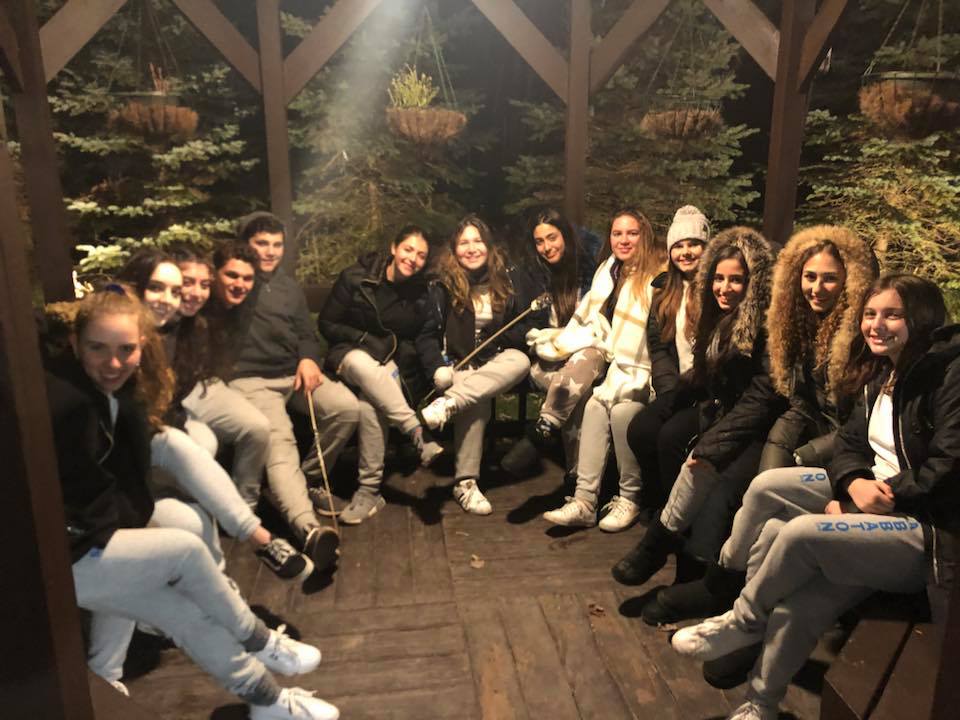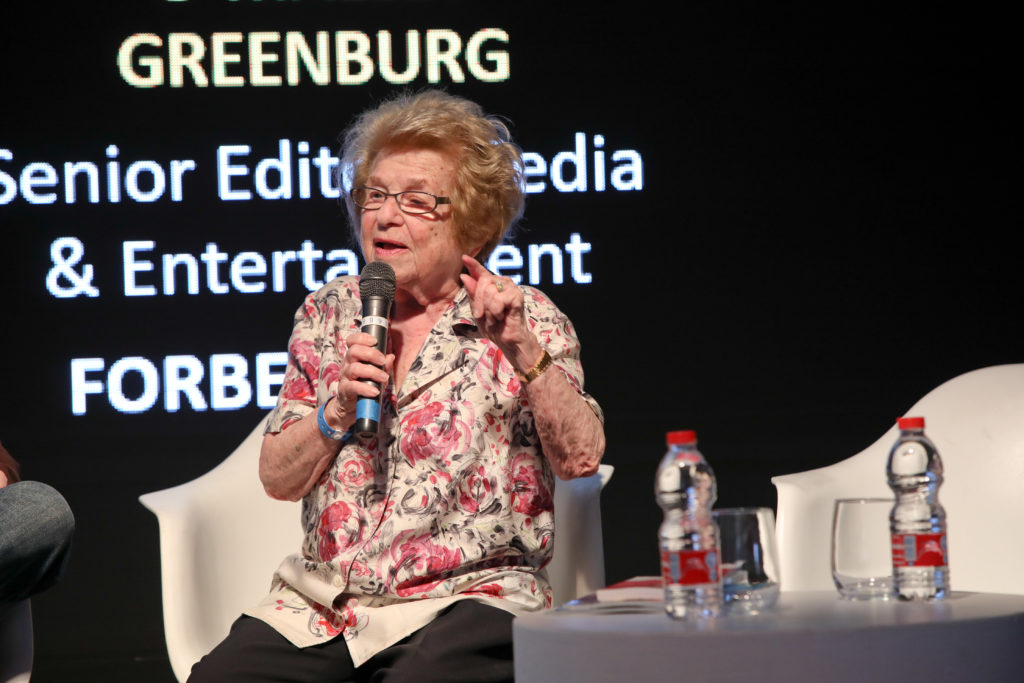Your Daily Phil: A first-ever census of Jewish educators + meeting the needs of commuter students
Good Friday morning!
The Orthodox Union’s school advocacy arm, Teach Coalition, is seeking a $150 per pupil increase in transportation funding from the state of New Jersey in fiscal year 2022, Dan Mitzner, Teach Coalition’s director of state political affairs, told eJewishPhilanthropy. The budget must be passed by July 1.
The formula by which the state calculates how much it will give to nonpublic schools for busing was set in 2003, which means parents and schools have had to absorb rising costs since then, Mitzner said. In partnership with such allies as the New Jersey Catholic Conference, the coalition is asking for $1,150 per student.
“We know it’s an aggressive number, but funding has been frozen for years,” Mitzner said.
Teach Coalition represents 150,000 non-public school students in New Jersey and also works in California, Florida, New York and Pennsylvania.
Teach Coalition is also asking for an increase of $10 per student to offset pandemic-related expenses such as equipment used to create remote learning systems. Gov. Phil Murphy’s proposed budget maintains last year’s funding level for technology in nonpublic schools at $36 per student.
The budget includes an increase of $10 per pupil, to $112 from $102, for nursing in non-public schools, Mitzner said.
The Jewish Federation of Northern New Jersey has called for an end to attacks on an elementary school student who wrote an essay from the perspective of Adolf Hitler to fulfill an assignment from a Jewish teacher. “Social media has sadly played a very negative role in this situation,” the federation wrote on its Facebook page. “We are aware that the surge in anti-Semitism in the country is troubling and unacceptable, but the vitriol surrounding this incident has been misplaced.”
LEARNING TO COUNT
Researchers arrive at a first-ever estimate of Jewish educators


eJP Archives
There were more than 72,000 Jewish educators working in the United States in 2019, according to a new study from the Collaborative for Applied Studies in Jewish Education (CASJE) that aims to better understand and support the Jewish educational workforce. The study’s authors and backers told eJewishPhilanthropy’s Helen Chernikoff that this research is the first of its kind.
Drawing a baseline: “Any mature and specific field needs a knowledge base for policy makers and funders to make decisions, respond to needs and take advantage of opportunities,” said Stacie Cherner, director of learning and evaluation at the Jim Joseph Foundation, which funded the research for the report, along with the William Davidson Foundation. Researchers have in the past counted Jewish day school and yeshiva teachers, as in the Educators in Jewish Schools Study of 2006 by the Jewish Education Center of North America, said Arielle Levites, CASJE’s managing director.
A new definition: This study uses a much broader definition of “educator”: Someone who educates or “engages” in a Jewish setting, regardless of the subject taught or whether the educator identifies as Jewish. This includes full-time, part-time and seasonal workers, but no pulpit rabbis, people who work solely in operations or administration or those who have a non-educational expertise, such as school psychologist or therapist. The study counted educators not only in schools but also in camps, supplementary schools, preschools, youth groups, museums, adult education programs, college campus organizations, afterschool programs and family engagement or social justice organizations.
Outside the classroom: Engagement programs might include work with adults or families, and their inclusion reflects the researchers’ aspiration to look beyond formal school settings to include other educational experiences, such as those that happen at Moishe House, a global network of housing for young Jewish adults, or OneTable, which facilitates Shabbat meals, Levites said. The census is the first of a four-part series of papers exploring Jewish educators’ career trajectories, to be released starting in July, Levites said. “The most important factor in a student’s success is the teacher,” she said. “We need to know how to support their development, how we recruit them, how we prepare them. All of that matters.”
Dull is good
The Jews in the Pew: What the 2021 Pew report tells us about modern identity


Shutterstock
“Will we learn more if we actually observe how Jews live their lives instead of asking them about it?,” asks Andrés Spokoiny, president and CEO of Jewish Funders Network, in an opinion piece for eJewishPhilanthropy.
Pew two: “No bombshells, no surprises, no Jewish leaders pulling their hair and crying ‘gevalt.’ The Jewish population is growing at the same pace as the general population, and levels of affiliation are fairly stable. Dull. But dull is good!”
Remaining neutral: “Good demographers, and especially the world-class professionals of Pew show data; they don’t offer prescriptions or judgment. Data, like a Jewish text, can be interpreted in many ways, and all sorts of hidden messages can be extracted from it through the hermeneutics of experience and comparison with the reality that communal professionals observe in our daily life.”
Being cautious: “[A] word of caution and a suggestion for demographers and sociologists: All the tools we use to study Jews — surveys and questionnaires — rely on reported reality, not reality itself. They ask but don’t observe… The next step in data generation is, in my view, twofold: We need ethnographic data based on observation, not on self-reporting, and we need the different studies we produce to “talk to each other.”
VIRTUAL INTERNSHIPS
Meeting the growing needs of commuter students


Courtesy
“Commuter students, like their counterparts at traditional residential colleges and universities, have suffered the tremendous loss of access to in-person education, social opportunity, and the college experience as a result because of the pandemic. However, in other ways, their experiences are quite unique,” write Merav Fine Braun and Jonah Geffen of Hunter Hillel in an opinion piece for eJewishPhilanthropy.
Spring 2020: “When commuter students lost their summer internships last year, they also missed out on the learning process that accompanied it… These students came to us at Hunter Hillel asking how they could continue to learn these important skills from their apartment, to keep growing their career as internships were canceled.”
Fast forward: “We took our skills in program design, student engagement, and needs assessment and went into curriculum development overdrive. This virtual, self-directed internship was designed to provide students with staff mentorship, professional support, and skills so that their pandemic summer would be a productive one that would help set the stage for what was sure to be a challenging job market when they graduate.”
Lasting impact: “The summer group was so successful we implemented a cohort for each semester of the 2020-2021 school year. Last semester alone, 25% of participants who completed the internship had full-time jobs or internships at its end. This is the kind of lasting communal impact that is possible when we work together to serve our students’ most pressing needs.”
Worthy Reads
Sounds Of Silence: Too many employers are either silent on their post-pandemic office strategy or talking about it in vague terms, write David Greenway, Kimberly Merriman and Tamara Montag-Smit in The Conversation, citing a recent survey of full-time corporate or government employees and their own research using a dataset of almost 600,000 people. This communication is hurting morale and retention, especially among employees who based significant personal decisions, such as where to live, on what employers told them earlier in the pandemic: “What workers want most from management are more remote-work resources, updated policies on flexibility and more communication from leadership.” [Conversation]
Taking Feedback: In Inside Philanthropy, Dawn Wolfe explores the nuances of a new, five-year grantmaking strategy from the Chicago-based Joyce Foundation, which is notable for its unusually long time frame and for provisions created in response to grantee suggestions, including reduced reporting requirements and multiyear grants. The plan also commits the foundation to direct $100 million of its roughly $1 billion in assets to social impact investments in early-stage firms that are racially and gender-diverse. “Our orientation is not about playing it safe … we learn from what we weren’t able to accomplish,” said Darren Reisberg, vice president of programs and strategy at the foundation. [InsidePhilanthropy]
Ripple Effect: Observers of the nonprofit sector are starting to understand that Mackenzie Scott’s $5.7 billion in unrestricted, one-time donations will have an impact not just on the original grantees, but far beyond them, writes Maria Di Mento in the Chronicle of Philanthropy. Her gifts have created a virtuous circle in which the recipients use the funds to expand their work, and then secure additional funding from banks and other foundations who trust Scott’s judgement. “Coming out of the tech world and the whole notion of disruption, I would say she is the big disrupter of traditional billionaire philanthropy,” said Chuck Collins, who leads the Program on Inequality and the Common Good at the Institute for Policy Studies. [ChroniclePhilanthropy]
Complicated Plan: A group of about 600,000 individuals, companies and governments with opioid-related claims against Purdue Pharma, the maker of Oxycontin founded by the Sackler family, will likely vote this summer on the company’s bankruptcy plan, described by attorneys involved as “one of the most complicated and controversial bankruptcies ever,” reports Brian Mann on NPR. If the creditors vote in favor of the plan, it will provide immunity from future lawsuits to more than 160 financial trusts, dozens of Sackler family members and at least 170 other entities associated with the family, which has surrendered ownership of Pursue Pharma but will remain one of the most wealthy in the country. The plan will distribute hundreds of millions of dollars each year in aid to communities and individuals harmed by opioids, but some critics say it’s too lenient: “The bankruptcy system should not be allowed to shield non-bankrupt billionaires,” Massachusetts Attorney General Maura Healey said. [NPR]
Community Comms
Apply! Want to join the team at Jewish Insider/eJewish Philanthropy? We’re looking for a top-notch philanthropy editor. Learn more here.
Be featured: Email us to inform the eJP readership of your upcoming event, job opening, or other communication.
Word on the Street
Yeshiva University held its 90th annual commencement exercises in person on Wednesday… The Jewish Communal Fund of New York approved nearly $700,000 in charitable grants to Jewish charities through its endowment… A museum in the United Arab Emiratesdebuted an exhibition about the Holocaust that also aims to raise awareness about antisemitism amid an increase in hate crimes against Jews worldwide… For the first time in 100 years the German army will appoint a chief rabbi and other rabbis to its military rabbinate… A recent assessment of the New York Pooled PRI Fund suggests that NYPRI’s unique “opt-in” model might be worthy of consideration in other situations… Google Play and Apple’s App Store are now featuring the BitDonate app allowing cryptocurrency donations to organizations and causes using GuideStar’s nonprofit database…
Pic of the Day


The Florida Holocaust Museum
At the Florida Holocaust Museum’s #UniteAgainstHate solidarity event yesterday, religious and community leaders gathered to support the museum after it was targeted with antisemitic graffiti last week. Michael Igel, chair of the museum’s board, held aloft his copy of Elie Wiesel’s book Night.
Birthdays


Maayan Jaffe-Hoffman for eJP
Holocaust survivor via the Kindertransport, sniper for the Haganah and renowned sex therapist, Ruth Westheimer (“Dr. Ruth”) celebrates today…
FRIDAY: Co-founder of Boston Properties and owner of U.S. News & World Report, Mort Zuckerman… Emeritus professor at New Jersey Institute of Technology, David Kristol… Professor of organic chemistry at the Weizmann Institute of Science and winner of the 2012 Israel Prize, David Milstein… Retired chief justice of the Michigan Supreme Court, Stephen J. Markman… Judge on the Court of Common Pleas in Philadelphia, he was previously the longest tenured member of the Pennsylvania House of Representatives (42 years from 1974 to 2016), Mark B. Cohen… Lineman for the Miami Dolphins (1973-1984), now a judge on the Eleventh Judicial Circuit of Florida, Ed Newman… British journalist and columnist, Melanie Phillips… First-ever Jewish governor of Hawaii and later Chief Operating Officer of Illinois, Linda Lingle… President and CEO of the Metropolitan Museum of Art in NYC, Daniel H. Weiss… Co-founder of Ripco Real Estate and a partner in Sagamore Hill, Todd Cooper… U.S. Senator Mike Lee (R-UT)… French-Israeli entrepreneur and angel investor, Jeremie Berrebi… DC-based photographer and founder of Revamped Media, Daniel Swartz… Reporter for The Washington Post, Colby Itkowitz… Israeli supermodel, Bar Refaeli… Senior planning analyst at Con Edison, Adam E. Soclof… Communications and policy advisor for Congressman Ted Deutch (D-FL-22), Jason Hillel Attermann… Military correspondent for The Times of Israel, Judah Ari Gross… Producer of NBC’s Meet the Press, Emily Gold…
SATURDAY: Lithuanian-born Holocaust survivor and co-founder of the Virginia Holocaust Museum in Richmond, Virginia, known for his ever-present cowboy hat, Jay M. Ipson… Actress and sales consultant for Chubb’s Combined Insurance, Barbara Pergament… Training director and broker associate of the Santa Monica, Berkshire Hathaway Home Services branch, Saul Bubis… Owner of the NFL’s New England Patriots, Robert Kraft… Former project manager at CSA Group, now an ESG consultant, Dan Yurman… VP of new business development at Maresco & Partners, Linda Greenfield… Author and financial advisor, Susan Lynn “Suze” Orman… Audrey Freedman-Habush… Portrait photographer and visual anthropologist, she is the author of The Jews of Wyoming: Fringe of the Diaspora, Penny Diane Wolin… Former commissioner on the U.S. International Trade Commission (2007-2017), now an international trade attorney at McDermott Will & Emery, Dean A. Pinkert… Best-selling instrumental musician, the saxophonist “Kenny G,” Kenneth Bruce Gorelick… Columnist for the New York Post, Andrea Peyser… Counsel for Alan Taylor Real Estate, Sam Kraemer… EVP and managing director at DC’s Burson Cohn & Wolfe (BCW), Michael Heimowitz… Optometrist, elected in 2014 and re-elected in 2018 as a member of the Ontario Provincial Parliament belonging to the Ontario Progressive Conservative Party, Gila Deborah Martow… Partner in the government, law and policy practice of Greenberg Traurig, he is a candidate for NYC Comptroller, Mark S. Weprin… First ever Jewish Speaker of the Virginia House of Delegates, Eileen R. Filler-Corn… Member of Congress (D-PA-6), her father is a Jewish Holocaust survivor from Poland, Christina Jampoler Houlahan… Former Member of the British Parliament (2005-2019) from the Conservative Party, Baron Ed Vaizey… Entrepreneur, venture capitalist and author, Nova Spivack… Professor of Israel Studies at UCLA, Dov Morris Waxman… Co-founder of BlueLabs, his father and grandfather were both rabbis, Elan Alter Kriegel… Director of policy at Ed Choice, Jason Bedrick… Women’s philanthropy and volunteer director at Shalom Austin, Arielle Levy… Account supervisor at DKC, Maya Bronstein…
SUNDAY: US District Court Judge since 1994, on senior status since 2005, serving in the Eastern District of New York, Frederic Block… Rabbi emeritus of Beth Abraham Synagogue in Dayton, Ohio, Rabbi Samuel Press… Rabbi at Congregation Machzikei Hadas in Ottawa since 1967 (now emeritus) and former co-president of the Canadian Jewish Congress, Rabbi Reuven Bulka… Real estate entrepreneur and executive chairman of the Hyatt Hotels Corporation, Thomas Pritzker… U.S. Senator Marsha Blackburn (R-TN)… Diplomat who has served as Israel’s ambassador to South Sudan (2012-2014) and Egypt (2014-2016), Haim Koren… Two-time Tony Award winner for acting, Harvey Fierstein… Comedian, musician and author, Sandra Bernhard… Radio news personality, known as “Lisa G,” Lisa Glasberg… Immediate past chair of the board of Prizmah: Center for Jewish Day Schools, Ann Pava… Israeli conductor and musician, Nir Brand… Former Majority Leader in the U.S. House of Representatives and now vice chair of investment bank Moelis & Company, Eric Cantor… Managing director and the chief interactive strategist for The Glover Park Group, Jonathan Kopp… Best-selling author and television personality, Anna Benjamin David… Chairman of Israeli fintech The Floor, he is the only child of Elie Wiesel, Elisha Wiesel… Hedge fund manager and founder of Saba Capital Management, Boaz Weinstein… 2019 Trump impeachment witness, he was director for European Affairs at the National Security Council, Lt. Colonel (retired), Alexander Semyon Vindman… and his twin brother, recently promoted Colonel Yevgeny Vindman, also a former NSC staffer… Political writer and strategist, Michael L. Goldfarb… ABC News White House and Capitol Hill reporter, Katherine B. Faulders… Associate director at Finsbury Glover Hering, Anna Epstein… Special assistant to Anita Dunn, Jordan Finkelstein… Director at Banner Public Affairs, Allie Freedman…
Email Editor@eJewishPhilanthropy.com to have your birthday included.








